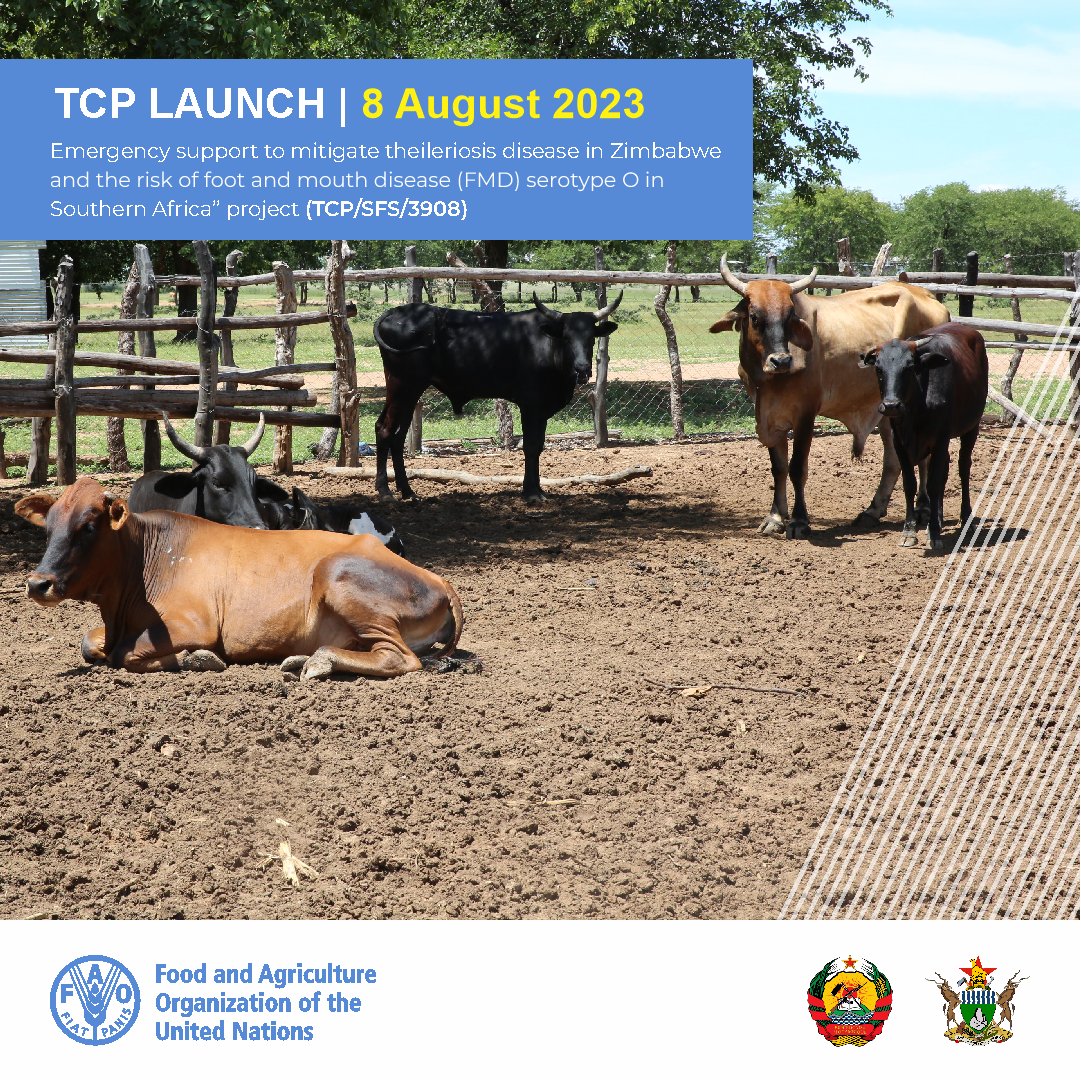|
Getting your Trinity Audio player ready...
|
Emergency support is launched to mitigate risks and to improve food security, nutrition, and access to the market of livestock farmers in Zimbabwe, Mozambique and neighbouring countries.
The Food and Agriculture Organization of the United Nations (FAO), in cooperation with the Government of Mozambique and the Government of Zimbabwe, launched a USD 500 000 Technical Cooperation Programme (TCP) to improve food and nutrition security and access to markets for livestock and their products through improved control of theileriosis and Foot-and-Mouth (FMD) serotype O in Southern Africa.
“This TCP speaks directly to our livestock growth plan, one of the key focuses of which is animal health, and where the country has a goal of increasing the national cattle herd from 5.5 million to 6 million by 2030. This is not possible to achieve in the face of animal disease outbreaks” said Dr Josphat Nyika, the Chief Director, Directorate of Veterinary Services in the Ministry of Lands, Agriculture, Fisheries, Water and Rural Development, Zimbabwe.
Animal disease outbreaks like FMD affect exports of beef and other related products, resulting in a negative impact on the economy. Countries experiencing FMD often suffer from trade embargoes limiting exports of even non-livestock products from affected areas.
Why is this a serious threat in Southern Africa?
There are at least four major tick-borne diseases (TBDs) affecting cattle in Southern Africa, namely theileriosis (known as January disease), babesiosis, ehrlichiosis and anaplasmosis. In Zimbabwe over 60 percent of ruminant livestock deaths are attributed to these TBDs while theileriosis, since 2017, has been the main cause of TBD-induced cattle deaths in the country.
Theileriosis is a fatal protozoal infection of cattle, and sometimes small ruminants, characterized by fever, lymph node enlargement, cloudiness of the eyes with watery discharge, froth from the mouth and nostrils, and sometimes sudden death.
During the 2022/2023 rainy season theileriosis claimed an unusually high number of cattle, surpassing the records of preceding years, which forced the country to declare war against January Disease. Zimbabwe is at risk of another animal disease, FMD serotype O.
FMD is an acute viral infection of cloven-hoofed animals, both domestic and wild, characterized by fever, the development of blisters in the mouth and feet, and a sudden onset of lameness. FMD serotype O is a type of disease that has not been present in southern Africa until recently. The disease
has been reported in Mozambique and Zambia. Zimbabwe shares borders with both countries. While Zimbabwe has never confirmed any cases of FMD serotype O, the virus has the potential to spread into the country.
“The rise in cattle fatalities in Zimbabwe due to theileriosis, and the imminent threat of spread of FMD serotype O in the region, jointly necessitated the development of this ‘Emergency support to mitigate theileriosis disease in Zimbabwe and the risk of FMD serotype O in Southern Africa’ project (TCP/SFS/3908),” said Patrice Talla, FAO Subregional Coordinator for Southern Africa and FAO Representative in Zimbabwe, Lesotho and Eswatini.
Dr Américo Manuel da Conceição, Chief Veterinary Officer for Mozambique acknowledged FAO support in the fight against FMD in the country, noting that, “the TCP is coming at an appropriate time when the country is fighting outbreaks of FMD serotype O as well as SAT2 (one of the seven major serotypes with significant genetic and epidemiological differences. These are O, A, C, SAT-1, SAT-2, SAT-3, and Asia-1).”
The FAO is focusing above all on developing capacity and advancing knowledge drawing on its international expertise to combat these animal diseases in a sustainable manner
In 2018, a serotype then considered exotic to Southern Africa, FMD serotype O, was reported in northern Zambia, between 2021-2022 the disease spread to Namibia, Malawi and more recently Mozambique. Namibia managed to repel the serotype O incursion in the last half of 2021.
Building on the successes in Namibia, the TCP will intensify surveillance efforts and build capacity through training of key personnel and farmers to reduce the risk posed by FMD serotype O not only in Mozambique and Zimbabwe but the rest of the region.
“In recent years, FAO has supported countries in the region to respond to several livestock-related emergencies occasioned by animal disease outbreaks and natural disasters. Technical assistance in the control of transboundary animal diseases (TADs), particularly efforts in mitigating the spread of the new serotype O of FMD virus has already been offered in Malawi, Comoros and Zambia,” added Patrice Talla.
The TCP is not considered a stand-alone intervention by FAO, but complements efforts currently in place at country level, in the fight against the impact of the two animal diseases.






